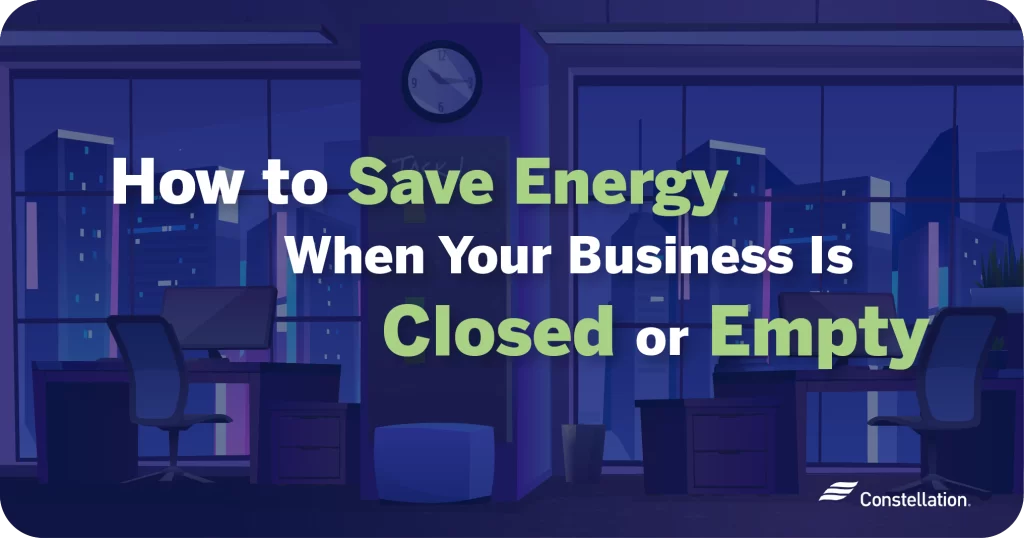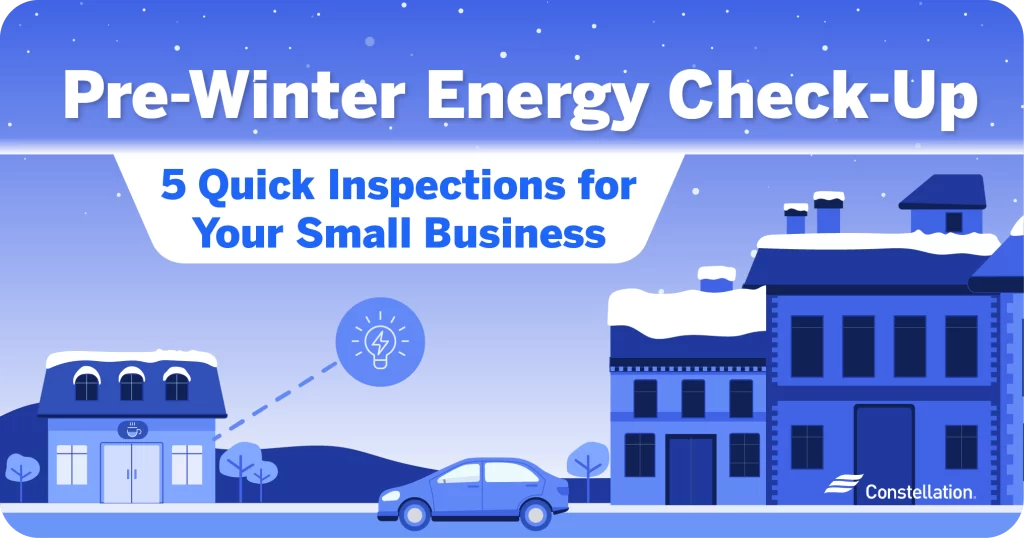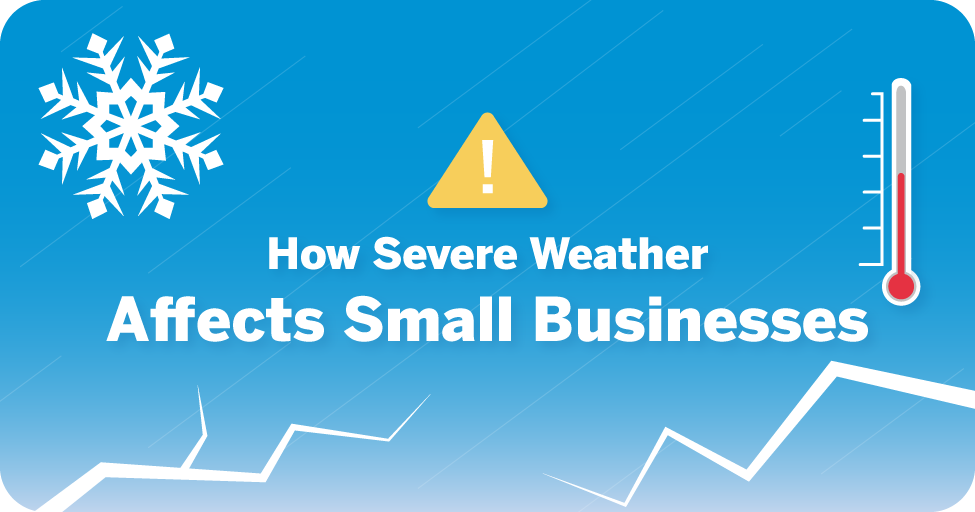
- Category:
Small Business Energy Savings -
Last updated:
January 14, 2025
How Severe Weather Affects Small Businesses
How does severe weather impact small businesses? And can you manage risks of severe weather? The actual impact of weather on your small business and your energy use will, of course, vary by the type of business you operate. Construction companies are affected differently than restaurants. Yet for any company, weather has a measurable influence on your small business and particularly on your energy consumption.
Are extreme weather events becoming more of a threat to businesses?
Extreme weather events are becoming a growing threat to businesses. A combination of factors are driving the growing risk and skyrocketing costs. Climate change and localized weather pattern shifts are leading to heat waves, wildfires, droughts, floods and severe storms. Development in areas prone to damaging weather events is expanding, along with inadequate investment into resilient infrastructure. Expensive assets are at risk, which leads to higher losses in the instance of a weather event. Building at urban edges with ever-expanding sprawl further damages ecosystems.
How does weather impact business?
How severe weather affects small businesses depends on the nature of extreme weather events. These types of severe weather have the greatest impact, both in terms of cost and business disruption.
- Temperature extremes drive up small business energy use and can strain, overload and damage equipment and systems. Higher demand for power can cause blackouts, as well.
- High winds, lightning and precipitation can disrupt power service to your business and may lead to localized or area-wide blackouts.
- Another extreme weather business impact is systemic stress on your business and your budget.
Elements of your business that are affected by extreme weather
Taking a closer look at how severe weather affects small business, you can assess the risks your business faces.
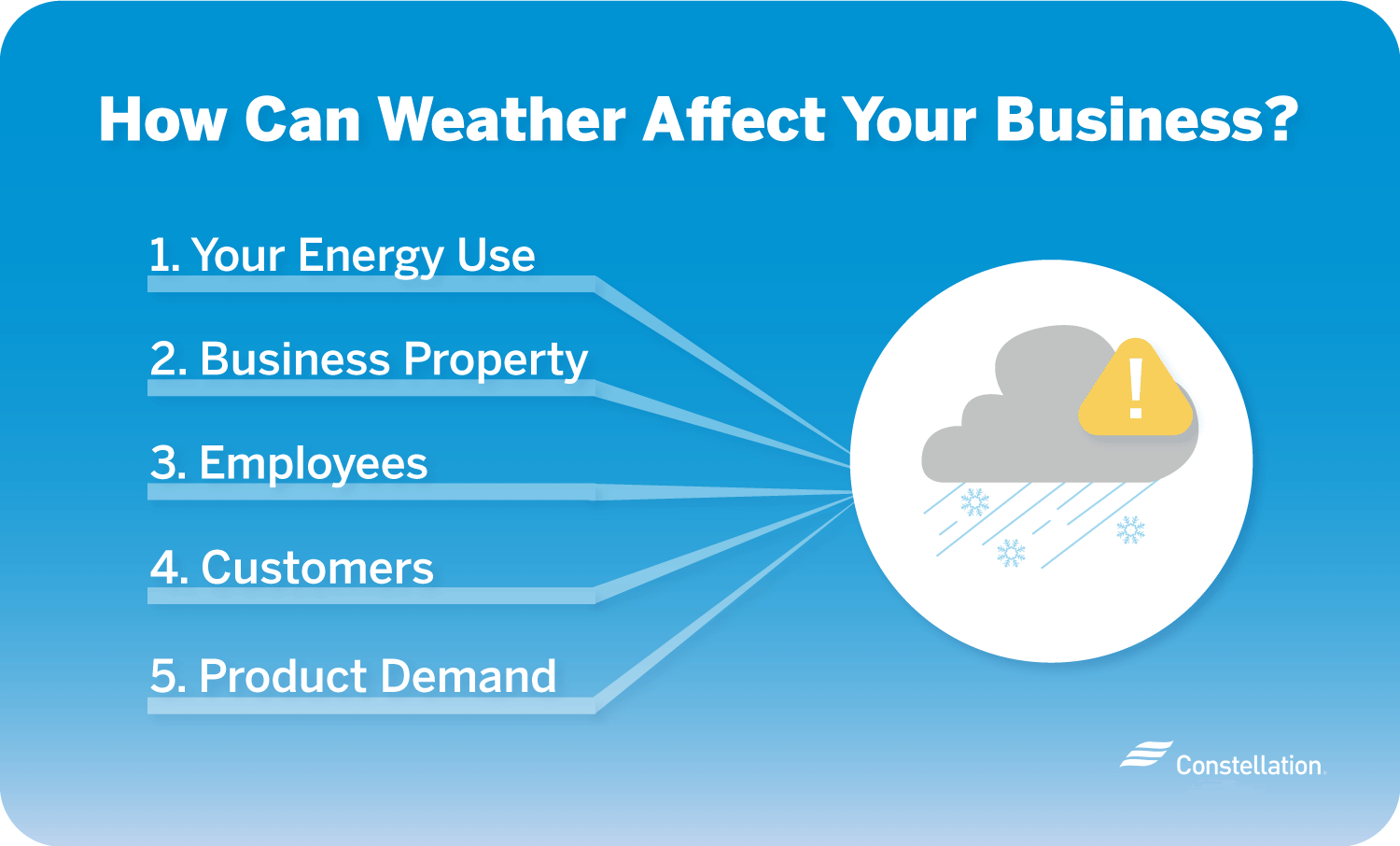
- Energy use. Severe weather can spike energy use as your HVAC struggles to maintain interior temperatures, manage humidity and filter air. Beyond the event itself, it takes power to clean and make repairs in the aftermath.
- Business property. Wind, rain, lightning strikes and flood waters can damage your building, compromising windows and doors and causing ceiling leaks. In addition to the costs, damaged facilities affect energy use and efficiency.
- Employees. If employees are flooded or snowed in and can’t get to work, productivity suffers. In situations when weather strikes during work hours, it can cause anxiety and distraction that affect your bottom line.
- Customers. Weather events can keep customers away. And in other cases, if you’re open, operating and providing a relevant product or service, weather can drive customers to your door.
- Product demand. Weather affects supply, shipping schedules and the cost of goods. On the demand side of the equation, weather can affect what customers need and want and, thus, your prices.
Types of severe weather that can impact your small business
In answering the question ‘how does weather affect business?’, consider the specific types of severe weather common in your area. What are your real risks? A business in South Dakota faces different weather risks than one in Florida.
Storms, floods and temperature extremes are challenges for your business, disrupting operations, upsetting employees and customers, damaging equipment and increasing energy consumption.
High temperatures
Extreme heat makes HVAC systems work harder and longer. The effect is magnified if humidity is a factor. When condensation collects on the coils of your air conditioner, it runs less efficiently and must run longer at a higher intensity.
An energy-efficient air conditioner can make a big difference. Heat pumps are an energy-efficient alternative but don’t function well in extreme heat. Beyond HVAC systems, if your business uses refrigeration, these systems have to work harder when indoor temperatures are higher.
Low temperatures
Low temperatures are just as hard on your business infrastructure and heating system. In cold weather, your furnace or heat pump has to work overtime. Many businesses find they need to use portable space heaters to augment their regular HVAC systems.
Other systems, like water heaters, may need to work harder as well. Not sufficiently heating the interior of your facilities is more than a matter of comfort; pipes can freeze and burst, causing expensive property damage.
Excessive rain and flooding
Rain keeps customers away, and when excessive, can lead to floods and leaks. Heavy rain often comes with wind and lightning, which can down power lines. Floods can affect the availability of power when the water damages power transmission lines or when supply is cut for safety reasons.
Snow and ice
Snowstorms and ice events are multifaceted challenges for businesses. They make it hard for employees to get to work and for customers to patronize your business. Snow and ice snap power lines just when you need electricity most to heat your facilities and protect your water lines from bursting. Most municipalities require you or your landlord to clear walkways and parking areas, making you liable for any mishaps. This is why it’s important to prepare your business for winter weather ahead of time.
Hurricanes
Hurricanes are a major threat to lives and businesses. The extreme damage they do to buildings, roads and other infrastructure cause disruption that lasts far beyond the storm itself.
Businesses that manage to stay open or get up and running quickly often benefit greatly when the need for products and services is high. Conversely, the storm can devastate businesses that are shut for long periods.
Tornadoes
Tornadoes, and the effects of the storms that bring them, damage business property and entire communities. Areas that take a direct hit can suffer anything from damaged roofs to complete destruction.
Power lines, transformers, wind turbines and other renewable energy technologies can be wrecked beyond repair, affecting power availability and costs long term.Your business may not be able to operate until infrastructure repairs are made.
Fire
Fire is a destructive force closely associated with weather events. Lightning can strike your structure, zapping your equipment and starting a blaze. Wildfires, often fueled by drought and/or high winds, can roar through and destroy your business, your suppliers and the homes of employees and customers. If fire misses your facilities, it can take out power generation and transmission infrastructure elsewhere that serves your business.
Acts of God
An “act of God” is an event, usually a natural disaster, that’s outside human control or action. Many of the weather events mentioned, from hail to hurricanes, qualify as acts of God.
The impacts include damage to property, inability of your business to operate and effects on customers and markets. Most acts of God have an energy angle: either the loss of power or highly increased demand for power. Any such event can be devastating to the survival of your business, making it important to manage risks of severe weather.
Establishing a plan for extreme weather events
Because of the high risks and high costs, it is important to prepare your small business for severe weather—and that involves both planning and setting up protections. Your plan should be based on the kinds of severe weather that strike your region, with an understanding of the likely effects on your business.
Think about what you can do to prevent problems, along with how you will react should severe weather strike. While good insurance coverage can help you financially recover, it is better to prevent losses. And finances are not the only concern. You will want to think about the well-being of your employees and customers, too.
These tips will help you think through the weather impact on your small business in a comprehensive way.
10 tips to prepare your small business for severe weather
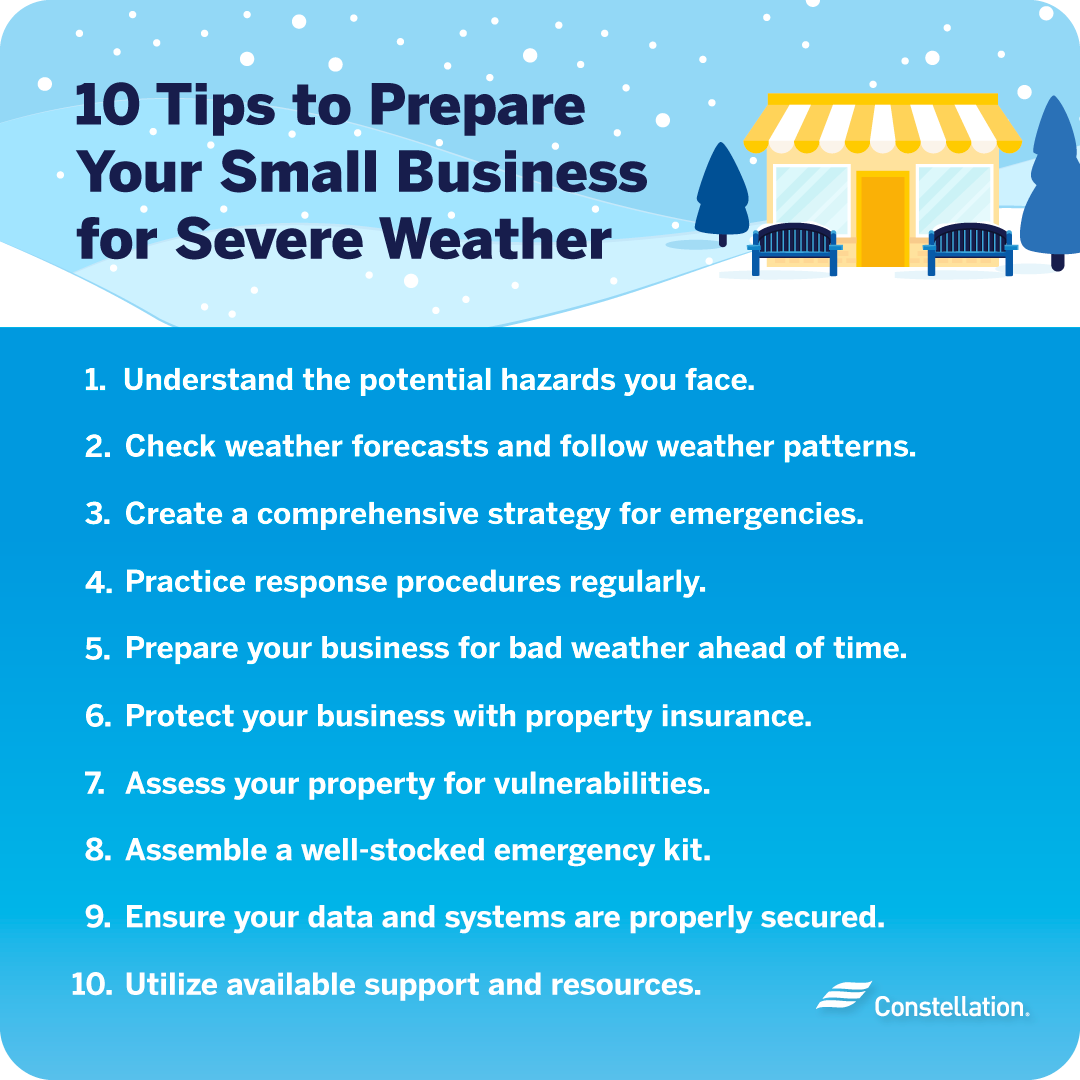
No one can stop the weather, but you can mitigate its negative impacts. Constellation offers some helpful resources, including a small business disaster recovery plan and an emergency plan for power outages, and we also suggest the emergency planning toolkits at Ready.gov. Further, the following key steps can prepare your small business for severe weather:
- Know your risks. Are you in an area prone to hurricanes? Be ready, too, for the tornadoes and floods that come with them. Or you may be in an area that sees regular ice storms. Go beyond your own personal experience of local severe weather and do research—it could be that “100-year event” that gets you.
- Always be vigilant. The sooner you see trouble coming, the better you can prepare. Make it a habit to check the weather daily and follow weekly, monthly and even seasonal weather patterns.
- Develop a plan. A good plan includes preparation, communication, protecting property, the safety of staff and customers and safeguarding the future of your business. Your plan should include scenarios for alternatives to stay operating when disaster strikes. A communications plan with widely shared emergency contact information is a must.
- Conduct drills. Regularly practice your plan so that every employee knows what to do to protect property and people. In times of stress, people default to training, which is why training is so important. After drills, discuss what went well and what didn’t, so you can refine your plan.
- Secure your property in advance. With a storm approaching, you may wish to board up windows and tie down loose objects. If a cold snap is in the forecast, add insulation and look for ways to prevent pipes from bursting.
- Protect your finances. Property insurance that includes coverage for specific weather events is a must. Add liability and business continuation coverage to fully protect your business.
- Inspect your property. Loose roofing materials, cracks in windows, poorly draining parking lots and other small flaws are vulnerabilities that can prove disastrous in bad weather. Reinforce building weaknesses in advance of severe weather.
- Have an emergency kit. While medical supplies may be helpful, think about having extra water, food, blankets, battery operated devices with extra batteries and more. Copies of vital documents and complete contact information for employees, insurance and utilities can speed your ability to recover.
- Secure data and systems. Make sure you have offsite backups of vital data and systems. Have a plan for working remotely if your facilities are damaged. Keep photos, receipts, maintenance records and other important information to document your business assets, and keep copies off site.
- Take advantage of assistance. State and federal agencies have resources to help you recover. Local charities can also help.
Extreme weather is affecting businesses more often and more severely than in the past, a trend that is not slowing. The difference between it being an unfortunate challenge that you manage and a business-ending disaster is a matter of how well you prepare your small business for severe weather. Indeed, how weather impacts a small business largely depends on your planning, how you manage risks of severe weather and the actions you take. There’s no substitute for being aware and ready.

